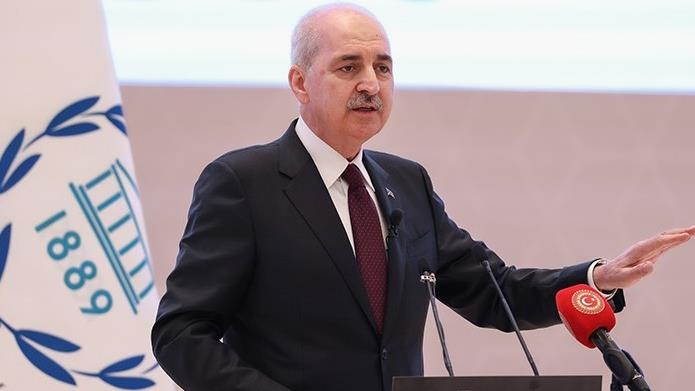TBMM
By Ali Kemal Akan, Aynur Ekiz and Asiye Latife Yilmaz
TASHKENT, Uzbekistan (AA) – Turkish Parliament Speaker Numan Kurtulmus stressed on Sunday the need for a new global economic system based on justice and equality, warning that any system that benefits only a few is bound to weaken states and lead to conflicts and wars.
Kurtulmus made these remarks at the 150th General Assembly of the Inter-Parliamentary Union (IPU) in Tashkent, Uzbekistan, at a time when the global order faced significant challenges, primarily due to the ongoing genocidal Israeli attacks on Gaza, which killed over 50,600 Palestinians, Russia’s war in Ukraine, and the Trump administration’s imposition of reciprocal tariffs.
Despite global political and economic crises, geopolitical tensions, and potential conflicts, the speaker said parliamentarians bear a fundamental responsibility.
“Even the events in Palestine alone, if we put aside all other global disasters and conflicts, clearly show that there is a need for a new system and a new global political and economic architecture,” Kurtulmus said.
He suggested that developments should prioritize human dignity, justice, and inclusivity over material wealth. He warned that if law, economy, and politics benefit only a few, it will destabilize societies, weaken states, and exacerbate global conflicts and war threats.
– 3 fundamental responsibilities of states and parliaments
Public opinion is being shaped through media monopolies and digital platforms, with algorithms becoming invisible forces that guide societies’ thought processes, Kurtulmus said, adding that this trend negatively impacts democracy.
“If we, as parliamentarians, do not intervene in this process, we are rapidly heading toward a world where the framework of democracy is narrowing,” he warned.
He underlined that there are three fundamental responsibilities for states and parliaments to build a fair development model: investing in education, developing social policies, and mobilizing all resources to establish a fair economic system.
– ‘Parliaments do not only deal with domestic politics’
Kurtulmus said parliaments deal with more than just domestic political issues, citing international politics, diplomatic tensions, and global power struggles as shaping the political landscape.
He emphasized that parliaments must develop a perspective based on peace, dialogue, and cooperation, beyond wars and conflicts.
– Palestine as a ‘litmus test’ for global justice and conscience
Kurtulmus said it is a moral obligation to share the truth that is staring everyone in the face, referring to the ongoing conflict in Gaza. He highlighted that over one and a half years, more than 50,600 innocent people have been brutally murdered, making it one of the greatest genocides in human history.
“Unfortunately, no institution in the global system is doing anything or is able to prevent this massacre, genocide, and crime against humanity. The voices raised are often weak and unable to seek the rights of the innocent Palestinian people,” he said.
The speaker described the developments in Palestine as a litmus test for global justice and conscience, adding: “Even the events in Palestine alone, if we put aside all other global disasters and conflicts, clearly show that there is a need for a new system and a new global political and economic architecture.
“I invite all of us, all world parliaments, to work together to establish a new, just, and equitable political and economic framework, and I express that the work we will do in this regard will be the greatest contribution to humanity.”

